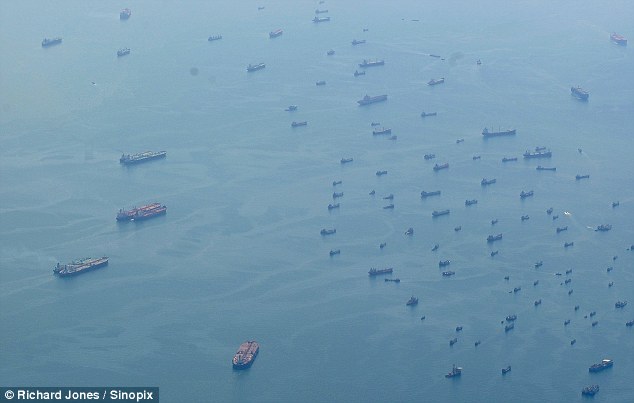There has been some talk of an impending recovery, maybe in time for the 2010 election. Don’t count on it.

Those are 500 ships, mostly tankers and container ships, that are anchored near Singapore. They are about 12 % of the commercial fleet and there are estimates that soon it may reach 25%.
Here, on a sleepy stretch of shoreline at the far end of Asia, is surely the biggest and most secretive gathering of ships in maritime history. Their numbers are equivalent to the entire British and American navies combined; their tonnage is far greater. Container ships, bulk carriers, oil tankers – all should be steaming fully laden between China, Britain, Europe and the US, stocking camera shops, PC Worlds and Argos depots ahead of the retail pandemonium of 2009. But their water has been stolen.
They are a powerful and tangible representation of the hurricanes that have been wrought by the global economic crisis; an iron curtain drawn along the coastline of the southern edge of Malaysia’s rural Johor state, 50 miles east of Singapore harbour.
Obama’s new trade war with China will not help.
Some experts believe the ratio of container ships sitting idle could rise to 25 per cent within two years in an extraordinary downturn that shipping giant Maersk has called a ‘crisis of historic dimensions’. Last month the company reported its first half-year loss in its 105-year history.
Martin Stopford, managing director of Clarksons, London’s biggest ship broker, says container shipping has been hit particularly hard: ‘In 2006 and 2007 trade was growing at 11 per cent. In 2008 it slowed down by 4.7 per cent. This year we think it might go down by as much as eight per cent. If it costs £7,000 a day to put the ship to sea and if you only get £6,000 a day, than you have got a decision to make.
‘Yet at the same time, the supply of container ships is growing. This year, supply could be up by around 12 per cent and demand is down by eight per cent. Twenty per cent spare is a lot of spare of anything – and it’s come out of nowhere.’
These empty ships should be carrying Christmas over to the West. All retailers will have already ordered their stock for the festive season long ago. With more than 92 per cent of all goods coming into the UK by sea, much of it should be on its way here if it is going to make it to the shelves before Christmas.
I recently posted my opinion that the stock market rally may be over. I haven’t changed my mind. The assault on capitalism by this administration will be a disaster.
I wrote something similar, but you issue more deeply exposed.
[…] More: Green shoots of hope ? […]
Actually, I’m not opposed to a “trade war.” Why should I be? I need American factories capable of producing the most modern and best “widgets” available to man far more than I want $1 polyester ties available at “Just A Buck.”
I also want AMERICANS employed at both low-skilled and high-skilled labor at good wages with good benefits.
Protectionism BUILT this nation, doc. You’re an amateur historian same as me… you know “America First” BUILT America.
I want the world to be OUR market to a larger degree than we’re THEIR market – especially when it comes to items effecting national security, both commodities and manufactured products.
On this one… GO, OBAMA, GO! That’s my view.
BILL
Like most underdeveloped countries, protectionism worked for us until about 1880. One big reason it worked is that Britain, the world’s richest and most powerful nation, promoted free trade (once the Napoleonic Wars were over) and kept the peace. That ended in 1914 and we took over, sort of, and for real in 1945. Protectionism was tried again in 1930 and didn’t work because, by that time, we needed global markets. There was no way that Germany would (or could) pay war reparations without trade. Anyway, we need free trade and we need to stop spending our seed corn.
Thank you for blogging, please write more!